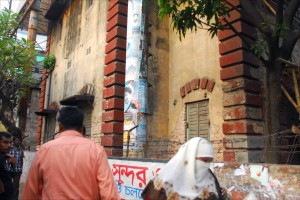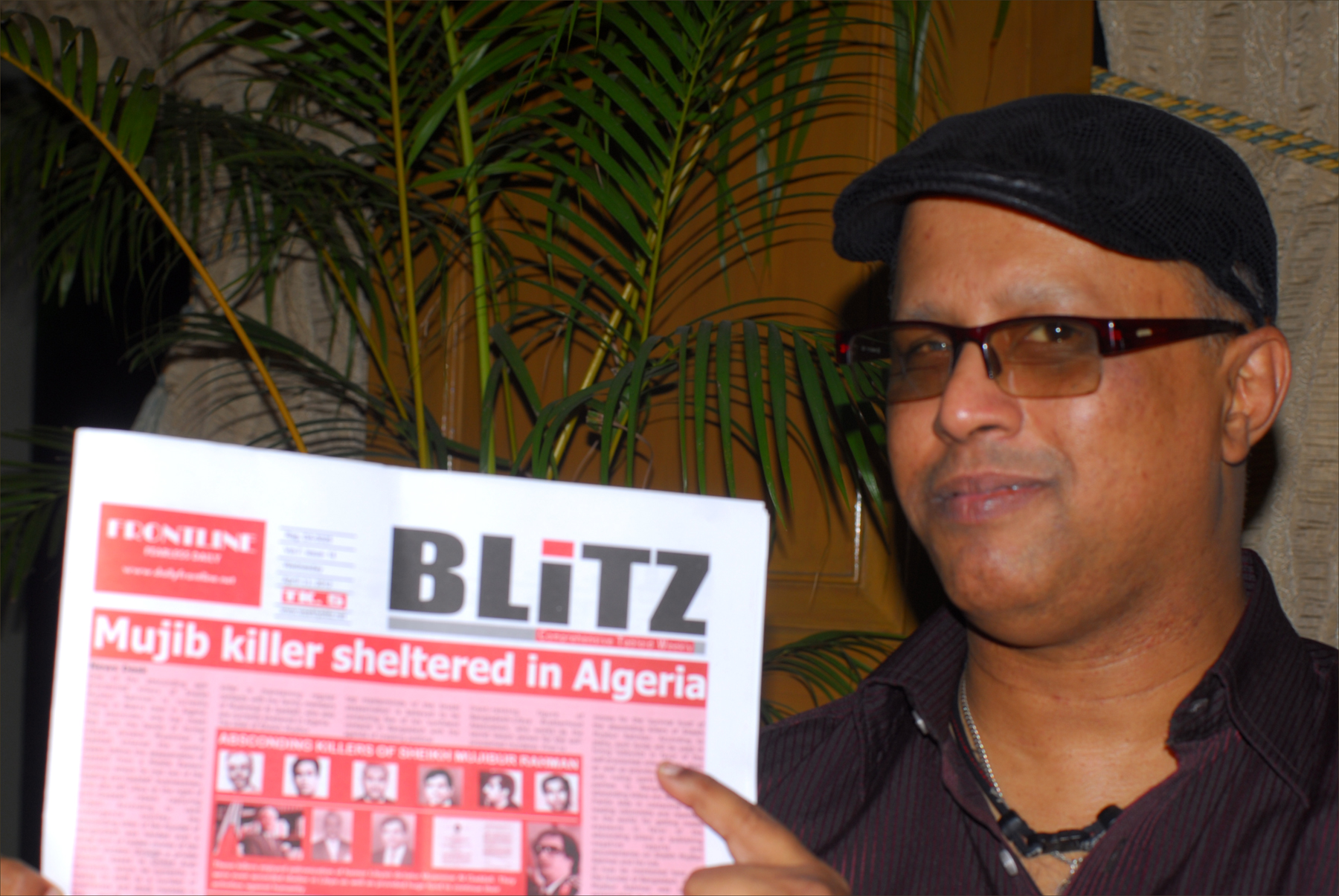Bangladeshi crusader: Friend of Israel, or con man?
DHAKA, Bangladesh— Salah Uddin Shoaib Choudhury sat at the café of the five-star Ruposhi Bangla Hotel in downtown Dhaka — capital of the third-largest Muslim nation on Earth — stridently proclaiming his love for Israel and the Jewish people.
“I am a Zionist and a friend of Israel,” he told this correspondent, in a voice loud enough to be heard by hotel guests and local businessmen sipping their afternoon tea at nearby tables.
But nobody paid any attention — and that in itself, says Choudhury, represents enormous progress in the impoverished People’s Republic of Bangladesh.
“Before 2003, you could not utter the word Israel in this country,” the devout Muslim said in a lengthy interview here. “Now we celebrate Rosh Hashana, and all the Jewish community in Dhaka participates. Even in some Bangladeshi media, they now allow positive articles on Israel. And I am more vocal than ever before.”
Choudhury, 46, is editor of the English-language Weekly Blitz — one of hundreds of newspapers in this overcrowded, predominantly Muslim nation of 160 million. He’s also a fraud, say many Jews in the United States and Israel who once supported him.
On Nov. 29, 2003, half a year after he began publishing his anti-jihadist tabloid, Choudhury was arrested at Dhaka’s Shahjalal International Airport as he was about to board a flight to Bangkok with connections to Tel Aviv, where he had planned to attend a Hebrew Writers’ Association conference.

“I was tortured with electric shocks. They put nails in my ear. They broke my kneecap with a hockey stick. I was interrogated for 15 days and not allowed to bathe,” he said. “They told me, ‘confess you’re a Zionist spy. Otherwise, why do you support Judaism?’ I said that I’m a good Muslim, and a good Muslim must trust the Jews and Christians. And I’m proud of that.”
On Jan. 24, 2004, barely two months after his initial arrest, Choudhury was charged with sedition, treason and blasphemy, “and put in a prison cell with the mentally insane, then another cell with hardened criminals,” he said.
Eventually the sedition charge was dropped, and the Dhaka government freed Choudhury on bail in April 2005 — though his office was later firebombed, and he was beaten by mobs and at one point briefly kidnapped by members of Bangladesh’s feared Rapid Action Battalion.
Richard Belkin, a Chicago doctor and Jewish activist, heard about Choudhury’s plight and petitioned Rep. Mark Kirk, R-Illinois, to intervene on the journalist’s behalf. In February 2007, a resolution co-sponsored by Kirk and Rep. Nita Lowey, D-New York, and demanding that Bangladesh drop all remaining charges against Choudhury passed the House 409-1.
The unlikely pro-Israel crusader quickly became the darling of the literary world.
Brenda West, writing in the online New English Review, noted that “many newspapers and institutions sang his praises with weekly articles. The Wall Street Journal carried admiring articles about him, as did many other newspapers, and bloggers flooded the Internet with their awe-stricken appreciation of what looked like Choudhury’s dedication to Western humanistic principles.”
Indeed, he was awarded the American Jewish Committee’s Moral Courage Award and received similar accolades from Prince Albert of Monaco and PEN USA. Both the European Parliament and the Australian Senate issued resolutions demanding an end to official harassment of Choudhury.
Choudhury embarked on a U.S. speaking tour in July 2007, visiting cities with large Jewish populations. In Baltimore, he lashed out at Islamic fundamentalism during a stirring speech at Congregation Ner Tamid. The Orthodox Jews in attendance, said local sponsor Jay Bernstein of Shalom USA Radio, “heard an incredible message of courage, self-sacrifice and determination which recalled eternal truths expressed thousands of years ago by our sages.”
Yet soon after his release on bail, allegations began surfacing that Choudhury was a ruthless con artist with a criminal past — and a pseudo-journalist guilty of plagiarism who had strong Islamist connections before he inexplicably became an anti-Islamist.
Some have even suggested that Choudhury may actually be an agent posing as a friend of the Jews in order to raise money for Islamic fundamentalist organizations.
From 2001 to 2002, Choudhury was, in fact, a correspondent for the Daily Inqilab, described as the mouthpiece of the far-right, anti-Western Jamaat-e-Islami political party and published by the late Maulana Abdul Mannan — a former government official widely implicated in the killing of Bangladeshi intellectuals during the nation’s 1971 war of independence against Pakistan.
Belkin, who runs a website that exposes alleged Muslim ethnic cleansing of minority Hindus in Bangladesh, hasn’t spoken to Choudhury in several years, for reasons he declined to explain. Yet he publicly expresses nothing but admiration for the man he helped rescue.
“While Shoaib and I are no longer working together nor have we been in contact for some time, he retains a place in my heart for his personal courage and for the ground he broke,” Belkin said in an email from Chicago. “Shoaib and I have taken separate paths since our struggles with Islamists and their water carriers, but those efforts revealed a man who willingly put himself in danger for a principle.”
Other Jews who previously stood up for Choudhury are far less kind.
In March 2011, Aryeh Yosef Gallin, founder and president of the Root and Branch Association — a New York-based group that promotes cooperation between the state of Israel and other nations — expelled Choudhury from its Islam-Israel Fellowship after reports surfaced that the Bangladeshi journalist had bilked “emotionally vulnerable single Jewish ladies” out of tens of thousands of dollars.
Gallin also removed all references to Choudhury from the upcoming third edition of his book, “Cracking the Qur’an Code.
And West, a self-described “Jewish woman and patriotic American who became very involved in counter-jihad work after 9/11,” said that “subsequent research, easily available to anyone who bothered to do a little bit of reading, showed that he was a total fraud with criminal ties. He had swindled not just two ardent Jewish supporters but everyone in the Zionist and counter-jihad movement who believed in him.”
Far from being “an award-winning journalist,” as Choudhury has called himself, West accuses him of writing bad checks, having ties to Bangladeshi mobsters, threatening foreign leaders with extortion and working for North Korea’s military regime.
Some of Choudhury’s claims do seem farfetched, to say the least.
Among other things, he insisted in our interview that his Wisconsin-sized country, known as East Pakistan until 1971, has at least 5,000 Jews — even though nearly all online references speak of a Jewish community numbering no more than a few hundred.
In a further stretch of the imagination, Choudhury told us that “you can now find Torahs in every bookstore in Bangladesh,” and that the 2,200-square-foot building facing Purana Paltan Street which supposedly housed Dhaka’s only synagogue sits on land now worth $10 million.
Yet a plaque on the colonial-looking structure clearly identifies it as a Masonic lodge built in 1910. Nowhere are Hebrew inscriptions or a Star of David visible from the outside or inside.
Choudhury’s attorney, Govinda Chandra Pramanik, is secretary-general of the Bangladesh National Hindu Grand Alliance. Pramanik told us that he was the only lawyer in Bangladesh who would agree to represent Choudhury.
“I am involved in a human rights organization which defends the rights of religious minorities,” said Pramanik, a Hindu. “After I started working on this case, I got threats from the intelligence services and a Muslim fundamentalist group, Khelafat Majlish, for trying to reinstate the Jewish presence in Bangladesh.”
That Jewish presence, Choudhury says, is largely hidden because Bangladesh refuses to recognize Judaism as a legal religion.
“You must be either Muslim, Christian, Hindu or Buddhist. There is no other option,” he said. “Even if you’re an atheist, you cannot declare it. And if you say you’re a Jew, it’s blasphemy — a violation of the constitution. So basically the Jewish community says they’re Jehovah’s Witnesses, because as soon as they’re identified as Jewish, the state machinery turns on them. It becomes totally oppressive.”
Choudhury prints 25,000 copies of the Weekly Blitz; it sells for five taka, the equivalent of seven U.S. cents. He insists his newspaper was the first in Bangladesh to write about Islamic NGOs operating in the country under the patronage of al-Qaeda.
“Not a single newspaper article of ours has ever been protested by the government. This means we have total credibility,” Choudhury said. He boasts that his newspaper — “the most influential in the Muslim world” — was the first in Bangladesh to write about Islamic NGOs operating in the country under the patronage of al-Qaeda.
Despite Choudhury’s insistence that his detractors’ accusations are all false, it doesn’t look like his legal troubles will be going away anytime soon.
“The court continues to postpone my trial, so I have to go to court every month, then they give me a new date. They don’t have any evidence, so they can’t continue the trial. But they won’t drop the charges either, because the government fears that would annoy the Islamists and anti-semites in this country.”
He adds: “I’m not Jewish, but I am a Zionist. And a Zionist must defend three things: the state of Israel, the Jewish people and the Jewish religion.”
(Feature photo: Bangladeshi publisher Salah Uddin Shoaib Choudhury holds up a copy of Weekly Blitz, which he claims is “the most influential newspaper in the Muslim world.” Photos by Larry Luxner.)

Larry Luxner is a freelance writer with The Washington Diplomat and former editor of CubaNews. Born and raised in Miami and now based in Israel, Larry has reported from every country in the Western Hemisphere. His specialty is Latin America and the Middle East, and he’s written more than 2,000 articles for publications ranging from National Journal to Saudi Aramco World. Larry also runs an Internet-based stock photo agency at www.luxner.com.


if he was ever related with jamat – e – islam or any islamist group he is a con man for sure. 🙂
In the 9th paragraph, the writer says “Eventually the sedition charge was dropped, and the Dhaka government freed Choudhury on bail in April 2005 — though his office was later firebombed, and he was beaten by mobs and at one point briefly kidnapped by members of Bangladesh’s feared Rapid Action Battalion.”
This information is totally wrong. The case no. 377, bearing sedition, treason and blasphemy charges are not dropped at all. Trial into this case is continuing at the court of the Metropolitan Session Judge in Dhaka since 2004. My next court appearance date is on 25th June, 2012.
As to comments by Brenda West, I already have protested such nefarious comments in the past.
In response to this letter, please note that during our interview in Dhaka, Mr. Choudhury led me to believe that he no longer faced a sedition charge (which carries a possible death penalty), though treason and blasphemy accusations against him remain. If in fact he is still being accused of sedition, then Mr. Choudhury clearly needs to spend more time on his own legal case — and less on trying to prove that this Jewish journalist with 30+ years of experience writing about Jewish communities around the world is really a closet anti-semite with an Islamist agenda.